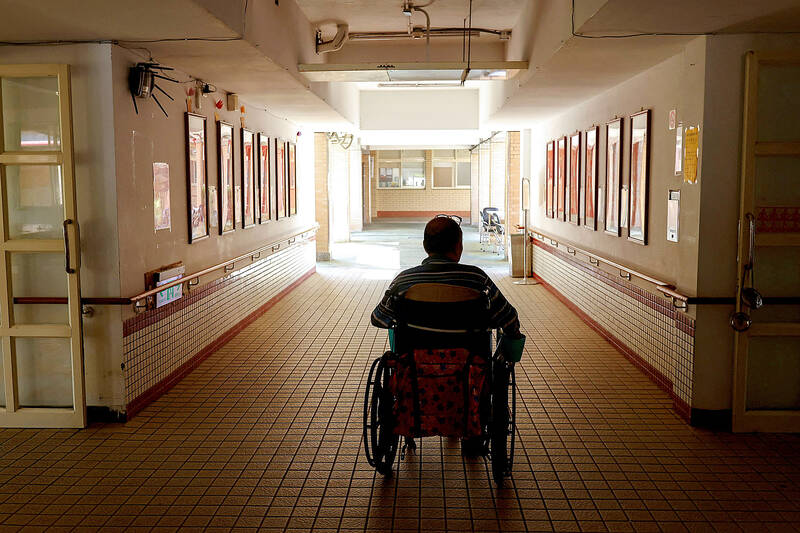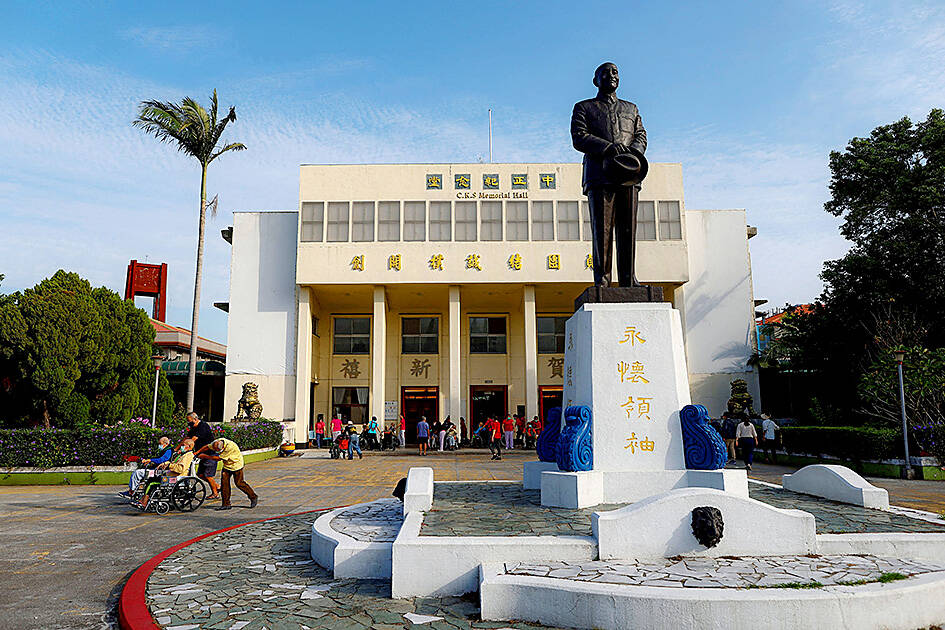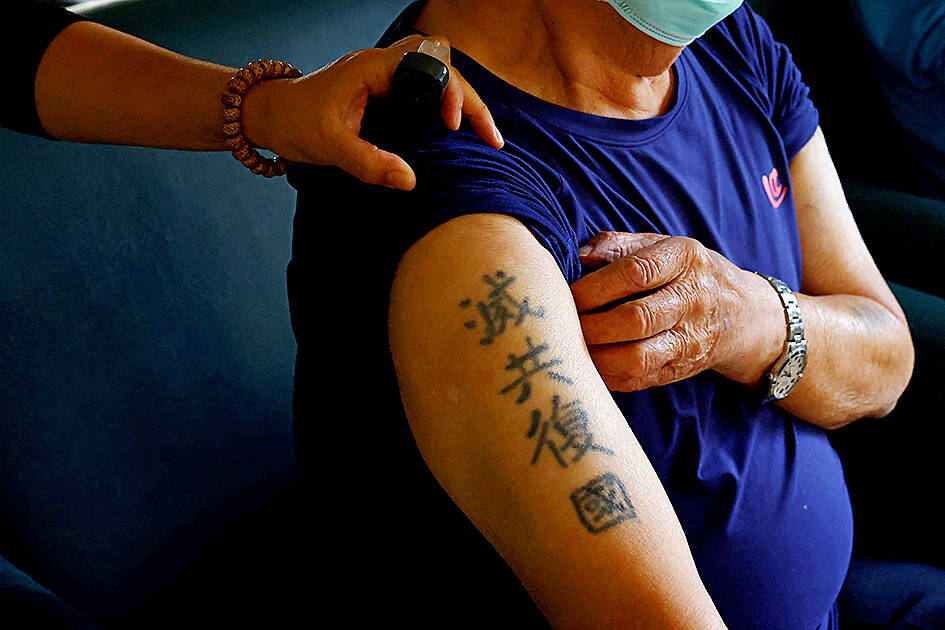Sun Kuo-hsi vividly remembers the chaos of the final years of the Chinese civil war and the government forces he fought for collapsing in front of Mao Zedong’s (毛澤東) Communists, forcing him to flee by boat to Taiwan in 1949 in a perilous eight-day crossing.
“There was no dock; everyone was splashing around in the water,” Sun, 110, said in his government-run veterans care home in the northern city of Taoyuan.
“Talking about it with young people now, they’ve not been through that time, they don’t care, say it’s in the past. Nobody listens,” said Sun, one of the last generation in Taiwan to have fought against China and experience war.

Photo: Reuters
Although the defeated Republic of China government fled to Taiwan more than seven decades, there was never a peace treaty to end the war with the People’s Republic of China. Neither government recognizes the other.
During the past four years, China has ramped up its military pressure against the nation it claims as Chinese territory, including staging two rounds of major military exercises, stoking fears of a war that could drag in the US.
Those tensions dominate campaigning in the run up to the Jan. 13 presidential and legislative elections.

Photo: Reuters
The main opposition party, the Chinese Nationalist Party (KMT), whose government fled China in 1949, has cast the poll as a choice between war and peace — a line Beijing has echoed.
The ruling Democratic Progressive Party (DPP), which champions Taiwan’s separate identity from China and says only Taiwan’s people can decide their future, has rejected that framing as scaremongering, saying nobody wants war.
Some veterans of Taiwan’s last battles with China — fighting over the island of Kinmen in 1958 — say they remember the horrors of conflict all too clearly.

Photo: Reuters
Yin Te-chun, 93, fought for China in the 1950-53 Korean war but was captured by UN forces.
To show his fervent desire to be sent to Taiwan when the war ended, he, like many others, tattooed himself with phrases such as “storm the bandit strongholds” — a reference to the Chinese Communists — and “kill Zhu,” the Chinese army chief.
Yin also fought against China when it attacked Kinmen, just offshore of the Chinese city of Xiamen.

Photo: Reuters
“I don’t know whether there’ll be fighting again,” he said. “It’s up to the DPP. If they keep going like this maybe there really will be.”
China dislikes the DPP, calling them separatists, and has rebuffed repeated offers of talks. The party’s presidential candidate, Vice President William Lai (賴清德), is leading in the polls.
‘WAR IS CRUEL’
Sun and many other veterans who cling closely to their Chinese identity do not represent mainstream Taiwan society, who overwhelmingly view themselves as Taiwanese and not Chinese, according to polls.
“There is certainly a generational shift; the older generation was a little more likely to be for unification and the younger generation a lot less likely,” said Sung Wen-ti, a political scientist at Australian National University’s Taiwan Studies Program.
“The younger people tend to have a separate, almost distinct, Taiwanese national identity as opposed to a more Chinese national identity,” he added. “So, in that sense, the trendlines on support for unification is a downward one.”
Taiwan’s veterans department does not keep exact numbers on how many soldiers who fought against China are still alive. As of last year it lists about 56,000 male veterans aged 85 and above, who would have been old enough to fight in that war.
The veteran’s home in Taoyuan is surrounded by mementoes of past conflict, including an old fighter plane and a tank flaking its entrance.
A large statue of former president Chiang Kai-shek (蔣介石), reviled by many Taiwanese as a despot but revered by others for fighting Mao’s Communists, stands in the courtyard where the veterans exercise or are pushed about in wheelchairs.
Wang Chih-chuan, 93, also a Korean war prisoner who came to Taiwan and eventually fought in Kinmen, joined the Chinese army when he was 13.
“When I joined up I was press-ganged. In the civil war, if they couldn’t get adults they’d get children,” he said. “To this day I don’t want to watch war on the television. War is cruel, callous.”

June 9 to June 15 A photo of two men riding trendy high-wheel Penny-Farthing bicycles past a Qing Dynasty gate aptly captures the essence of Taipei in 1897 — a newly colonized city on the cusp of great change. The Japanese began making significant modifications to the cityscape in 1899, tearing down Qing-era structures, widening boulevards and installing Western-style infrastructure and buildings. The photographer, Minosuke Imamura, only spent a year in Taiwan as a cartographer for the governor-general’s office, but he left behind a treasure trove of 130 images showing life at the onset of Japanese rule, spanning July 1897 to

One of the most important gripes that Taiwanese have about the Democratic Progressive Party (DPP) is that it has failed to deliver concretely on higher wages, housing prices and other bread-and-butter issues. The parallel complaint is that the DPP cares only about glamor issues, such as removing markers of Chinese Nationalist Party (KMT) colonialism by renaming them, or what the KMT codes as “de-Sinification.” Once again, as a critical election looms, the DPP is presenting evidence for that charge. The KMT was quick to jump on the recent proposal of the Ministry of the Interior (MOI) to rename roads that symbolize

On the evening of June 1, Control Yuan Secretary-General Lee Chun-yi (李俊俋) apologized and resigned in disgrace. His crime was instructing his driver to use a Control Yuan vehicle to transport his dog to a pet grooming salon. The Control Yuan is the government branch that investigates, audits and impeaches government officials for, among other things, misuse of government funds, so his misuse of a government vehicle was highly inappropriate. If this story were told to anyone living in the golden era of swaggering gangsters, flashy nouveau riche businessmen, and corrupt “black gold” politics of the 1980s and 1990s, they would have laughed.

Imagine being able to visit a museum and examine up close thousand-year-old pottery, revel alone in jewelry from centuries past, or peer inside a Versace bag. Now London’s V&A has launched a revolutionary new exhibition space, where visitors can choose from some 250,000 objects, order something they want to spend time looking at and have it delivered to a room for a private viewing. Most museums have thousands of precious and historic items hidden away in their stores, which the public never gets to see or enjoy. But the V&A Storehouse, which opened on May 31 in a converted warehouse, has come up